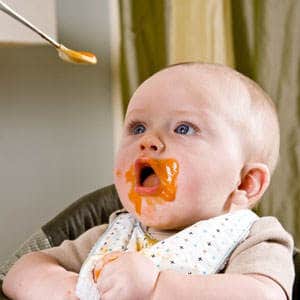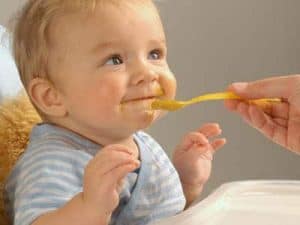When your baby turns to 6 months, you as a mother was so excited to introduce semi-liquid or semi-solid food to your baby. But at the same time lots of question come to our your mind.
What food to give to a six month old?
When to give food?
How much to give?
Is this food OK at this age?
Will that food cause allergy?
How can I make a food chart for six month old baby?
When my daughter turns to 5 n half months, I started asking question to my mother, mother in law, sisters and to my friends whose babies are elder then mine. I came across with lots of suggestions . I started note down all of them and now here I m with all the answers of your doubt.
Things you should know before introducing solid to your 6 months old baby
- If your 6 month 8 month old baby is just starting solids at this stage, start slowly, preparing a very small amount of whatever food you have chosen to begin with. Breast or bottle feed your baby first and then offer your little one solids. Its important to remember that baby’s milk continues to be more important than solids at this age , don’t worry when baby won’t eat more than a few bites.
- Signs like sitting with support, showing readiness to accept food or chew food, showing interest in food etc shows that its time to introduce solids in your baby’s menu.
- Read :Food for 9-10 Months old Baby
- Introduce new food items as breakfast. Avoid giving new food items during dinnertime. This is to help you watch your baby for food allergy and also to know whether he/she has any discomfort after having the new food.
- Introducing solid to your baby can cause constipation. So start giving water to your baby, it relief constipation.
- Babies of age 6 months and above and who have started on solids can have 2 to 4 ounces of water per day. This includes water in any form including soup, plain water or gruel water.
- Also some 6-month-old babies may not be ready for 3 meals a day. If your little one is not showing interest in having solids for any of the three meals, replace it with breast milk or formula milk.
- You can start by offering 1 or 2 tablespoon of each food. If he/she is showing more interest you can give her more. Never force-feed.
- Start giving food in purees/liquid consistency and slowly thicken the consistency of the food taking cues from your little one
- Keep in mind that breast milk or formula should be the major part of a six-month-old baby’s diet. So breastfeed or bottle-feed first and then give him solid food.
Food that should be introduce at 6-8 month
This sipper is really good and convenient to use.
- A variety of foods can be started at this stage eg. Rice and dal gruel (khichari), mashed rice and dal, lentil soup(dal pani), mashed vegetables, dalia, rice-milk, kheer, yoghurt, mashed paneer, custard and egg.
- Start one food items at a time and gradually increase the quantity and variety.
- Most children get bored with one food and need a change. You should appreciate the likes and dislikes of your child and honor them. Try saabudana porridge. Its very healthy and stomach soothing food for your baby.
- Offer those food that your child likes and enjoy and don’t impose your own likes or food that you feel are good or nutritious for your child.
- Initially food items may have to be finely mashed and later on child would accept semi-solid or grated foods.
- It is wrong belief that child must have teeth before he can accept or digest semi-solid food.
- Green vegetables like peas and carrots can be cooked and mashed in khichari.
- Vegetables can be cooked and stewed or steamed and then mashed in water in which they have been cooked. Add pinch of salt and butter or ghee(preferably home made) to improve the taste and flavor and make it more healthy.
- A variety of green vegetables can be given like peas,beans, tinda, gourd, loki and spinach etc. I always used to add spinach to the khichari when I prepare it for my daughter.
- Most children loved to have mashed potatoes.
- Give dals (pulses or lentils) without covering or chilka to improve digestibility. Moong and pigeon peas (Ar-ar or toor ki dal) are tolerated best.
- Dal must be mashed in the soup with a spoon or with a hand mixer and topped with butter or ghee before offering to the child.
- Butter and ghee are liked and tolerated well by most children and useful to increase the caloric density to provide for increased energy demands of the child. Prefer Home made ghee for your little one.
- A child who has a familiar tendency to be over weight or is gaining weight excessively, should not be given extra butter, oil or ghee.
- Home-made Yogurt is an excellent substitute for milk and can be given without any additive or after adding sugar or salt according to the liking of the child. Yogurt is well tolerated by the children who who do not tolerate milk due to deficiency of an enzyme lactase in their intestines. Children who develop abdominal pain on taking milk, will tolerate yogurt without any discomfort or bloating. My ped always suggest to give freshly prepared home made yogurt to my daughter as sometime she have loose motion. When she has loose motion ,i just stop giving her milk and start giving her yogurt by preparing chaas/buttermilk or lassi for her.
You can also refer this video to prepare apple suzi porridge /kheer for you baby
- You can start egg after 6 month if family is non-vegetarian. There are no nutritional virtues of giving raw egg (flipped in milk) and there is potential risk of development of slamonella infection. Start by giving egg yolk of a half-boiled or full -boiled egg.
- Egg yolk is rich in vitamins and iron while egg white is full of high quality proteins. Egg protein are of highest biological value and are easily digested.
- In some families,allergy to egg proteins may be prevalent and should be watched for. After taking an egg , if baby develops vomiting, skin rash, abdominal pain or turns pale stop giving egg to the child.
- Depending upon the cultural or regional food habits,children should be offered foods of their region and liking.
- Dosa,idli,upma, dhokla, suzi ka halwa, aate ka halwa etc. can be given a s weaning food.
Hope you get some idea about the food habits of 6 to 8 months babies. To get regular updates please subscribe to my blog and like my face book page.
please share the post if you find it good for your baby. Remember sharing good things is always good.


Leave a Reply